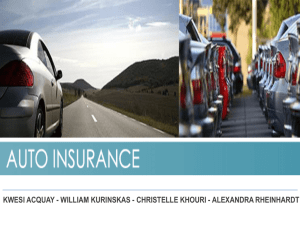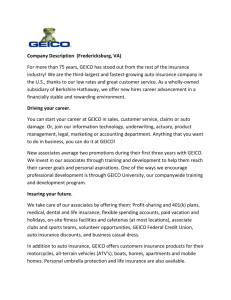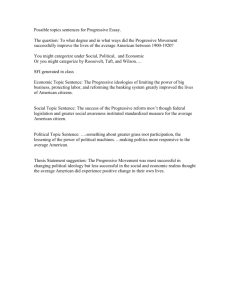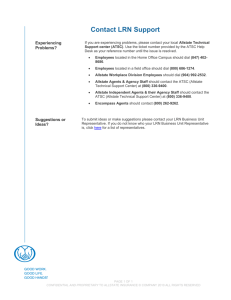Largest Auto Insurers Frequently Charge Higher Premiums To
advertisement
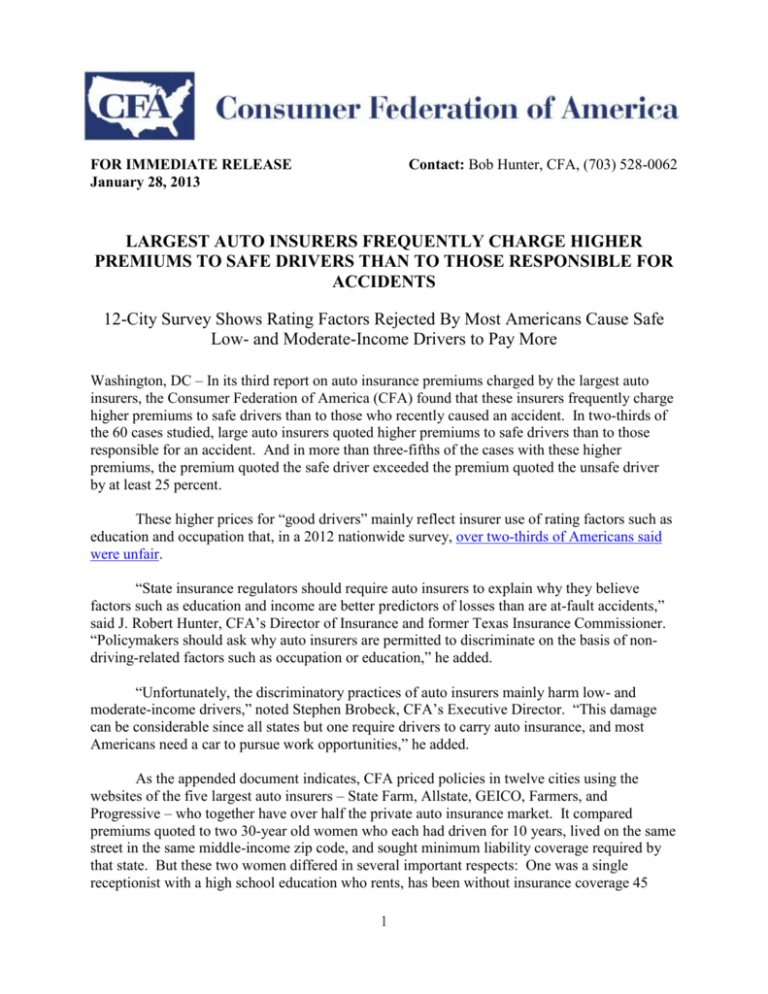
FOR IMMEDIATE RELEASE January 28, 2013 Contact: Bob Hunter, CFA, (703) 528-0062 LARGEST AUTO INSURERS FREQUENTLY CHARGE HIGHER PREMIUMS TO SAFE DRIVERS THAN TO THOSE RESPONSIBLE FOR ACCIDENTS 12-City Survey Shows Rating Factors Rejected By Most Americans Cause Safe Low- and Moderate-Income Drivers to Pay More Washington, DC – In its third report on auto insurance premiums charged by the largest auto insurers, the Consumer Federation of America (CFA) found that these insurers frequently charge higher premiums to safe drivers than to those who recently caused an accident. In two-thirds of the 60 cases studied, large auto insurers quoted higher premiums to safe drivers than to those responsible for an accident. And in more than three-fifths of the cases with these higher premiums, the premium quoted the safe driver exceeded the premium quoted the unsafe driver by at least 25 percent. These higher prices for “good drivers” mainly reflect insurer use of rating factors such as education and occupation that, in a 2012 nationwide survey, over two-thirds of Americans said were unfair. “State insurance regulators should require auto insurers to explain why they believe factors such as education and income are better predictors of losses than are at-fault accidents,” said J. Robert Hunter, CFA’s Director of Insurance and former Texas Insurance Commissioner. “Policymakers should ask why auto insurers are permitted to discriminate on the basis of nondriving-related factors such as occupation or education,” he added. “Unfortunately, the discriminatory practices of auto insurers mainly harm low- and moderate-income drivers,” noted Stephen Brobeck, CFA’s Executive Director. “This damage can be considerable since all states but one require drivers to carry auto insurance, and most Americans need a car to pursue work opportunities,” he added. As the appended document indicates, CFA priced policies in twelve cities using the websites of the five largest auto insurers – State Farm, Allstate, GEICO, Farmers, and Progressive – who together have over half the private auto insurance market. It compared premiums quoted to two 30-year old women who each had driven for 10 years, lived on the same street in the same middle-income zip code, and sought minimum liability coverage required by that state. But these two women differed in several important respects: One was a single receptionist with a high school education who rents, has been without insurance coverage 45 1 days, and has never had an accident or moving violation. And the other woman was a married executive with a Masters degree who owns a home, has had continuous insurance coverage, and has had an at-fault accident with $800 of damage within the past three years. Insurers Differ in Use of Discriminatory Factors There were significant differences, however, among the five major insurers. On the one hand, in every case Farmers, GEICO, and Progressive quoted the safe driver a higher premium than the driver causing an accident. (In several cases, companies refused a quote to the good driver but gave one to the accident-causer.) On the other hand, in all twelve cities State Farm charged the good driver less. Moreover, in all twelve cities, the rates quoted by State Farm were either the lowest (6 cities) or the second lowest (6 cities). “With nearly one-quarter of the private passenger auto insurance business, State Farm dominates the market. If they can be a successful company without using highly discriminatory factors, other large companies should be able to do so as well,” noted CFA’s Hunter. Prices Vary Considerably Among Cities and Insurers The most recent report priced policies in middle-income ZIP codes, not moderate-income zip codes, as in the two earlier reports. Yet, this report found similar pricing patterns, namely, virtually no consistency of pricing within cities or among companies. As the appended table reveals, among the twelve cities, Allstate’s annual premiums for good drivers ranged from $850 (St. Louis) to $3,292 (Baltimore) while Progressive’s annual premiums ranged from $864 (Cleveland) to $1,928 (Baltimore). There was also wide variation within individual cities. In Baltimore, despite the high rates quoted by Allstate and Progressive, a rate of $822 was quoted by GEICO for good drivers. And in Phoenix, the quoted Progressive rate was $1,304 while the quoted State Farm rate was only $480. “Again, our research on auto insurance prices reveals a marketplace that is highly uncompetitive,” said CFA’s Brobeck. “Any economist will tell you that when prices range 100%, even 200%, for similar products, that marketplace is not competitive. But it appears that this lack of competitive pricing mainly reflects the frequent lack of interest of major auto insurers in selling basic products to low- and moderate-income drivers,” he added. Most Quoted Prices to Safe Drivers Are Excessive and Unaffordable In 35 of the 60 cases studied, the insurers either quoted annual premiums in excess of $1,000 or refused to quote a price. And, in only four cases did they quote an annual premium under $500. “A fairly high percentage of low- and moderate-income drivers cannot afford to purchase auto insurance, which is why so many risk breaking the law and getting stuck with accident bills,” said CFA’s Hunter. “State regulators should ask insurers why they cannot offer more safe drivers basic minimum liability coverage for about $300, and never more than $500, annually. In California's state-run, low-income auto insurance program for good drivers, even most 2 participating drivers from Los Angeles are provided this coverage for under $400 annually,” he added. These premiums cover insurer losses with no subsidy from other drivers. The Consumer Federation of America is a non-profit association of more than 250 consumer groups that was established in 1968 to advance the consumer interest through research, advocacy, and education. 3 Comparison of Annual Auto Insurance Premiums for Minimum Liability Coverage Quoted a Receptionist with a Good Driving Record and an Executive with an At-Fault Accident Shared Characteristics Female, 30 years old, driven 10 years Reside in city in ZIP code with median income of about $50,000 Drive 2002 Honda Civic they own 7500 miles/year Minimum liability auto insurance coverage required by state law Varying Characteristics Receptionist: driver is a single receptionist with a high school education who rents, has been without insurance coverage 45 days, and has never had an accident or moving violation Executive: driver is a married executive with a Masters degree who owns a home, has had continuous insurance coverage, and has had an at-fault accident with $800 of damage within the past 3 years City Baltimore Washington, DC Atlanta Tampa Cleveland Company Allstate Farmers GEICO Progressive State Farm Allstate Farmers GEICO Progressive State Farm Allstate Farmers GEICO Progressive State Farm Allstate Farmers GEICO Progressive State Farm Allstate Farmers GEICO Progressive State Farm Receptionist ($) Executive ($) $3,292 NQ 822 1,928 1,082 1,622 2,074 760 1,344 1,210 1,248 1,274 812 1,224 770 NQ 2,952 NQ 1,748 1,792 1,072 NQ 454 864 436 $1,248 1,954 652 1,012 1,662 950 1,486 554 1,126 1,394 1,386 782 546 1,218 1,090 NQ 2,204 1,020 1,248 2,265 962 1,744 362 656 552 Difference ($) $2,044 +X 170 916 -580 672 588 206 218 -184 -138 492 266 6 -320 NV 748 +X 560 -473 110 +X 92 208 -116 Difference (%) 164% NV 26 91 -35 71 40 37 19 -13 -10 63 49 0.5 -29 NV 34 NV 40 -21 11 NV 25 32 -21 Quotes greater than $1,000 or no quote provided Quote of less than $500 Yes Yes Yes Yes Yes Yes Yes Yes Yes Yes Yes Yes Yes Yes Yes Yes Yes Yes Yes Yes Comparison of Annual Auto Insurance Premiums for Minimum Liability Coverage Quoted a Receptionist with a Good Driving Record and an Executive with an At-Fault Accident City Chicago St. Louis Denver Houston Phoenix Los Angeles Seattle Company Allstate Farmers GEICO Progressive State Farm Allstate Farmers GEICO Progressive State Farm Allstate Farmers GEICO Progressive State Farm Allstate Farmers GEICO Progressive State Farm Allstate Farmers GEICO Progressive State Farm Allstate Farmers GEICO Progressive State Farm Allstate Farmers GEICO Progressive State Farm Receptionist Executive $1,358 NQ 632 1,348 310 850 NQ 616 1,260 578 1,334 NQ 588 1,003 538 1,184 NQ 588 1,226 1,048 944 NQ 540 1,304 480 832 888 624 790 678 1,554 NQ 624 1,028 784 $1,454 2,046 392 946 650 1,170 1,366 440 1,000 670 1,420 1,046 476 862 634 1,006 1,234 506 1,104 1,302 1,228 844 366 1,186 714 1,334 678 578 694 942 1,890 1,888 604 780 1,044 Difference ($) -96 +X 240 402 -340 -320 +X 176 260 -92 -86 +X 112 141 -96 178 +X 82 122 -254 -284 +X 174 118 -234 -502 210 46 96 -264 -336 +X 20 248 -260 Difference (%) -7% NV 61 42 -52 -27 NV 40 26 -14 -6 NV 24 16 -15 18 NV 16 11 -20 -23 NV 48 10 -33 -38 31 8 14 -28 -18 NV 3 32 -25 Quotes greater than $1,000 or no quote provided Quote of less than $500 Yes Yes Yes Yes Yes Yes Yes Yes Yes Yes Yes Yes Yes Yes Yes Yes Yes Yes Yes NQ = no quote (values of NQ assumed to be higher than values of actual quotes) NV = no values available to allow computation of differences X = positive or negative unknown Consumer Federation of America | January 2013
